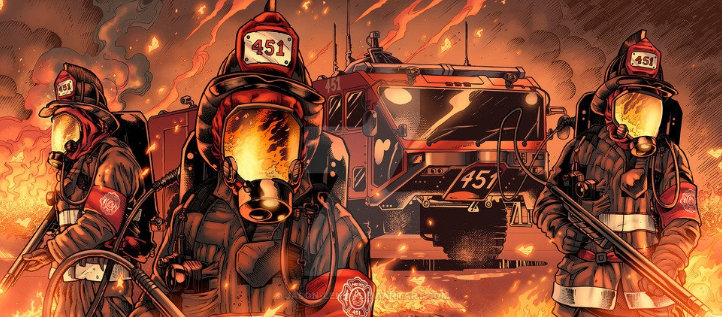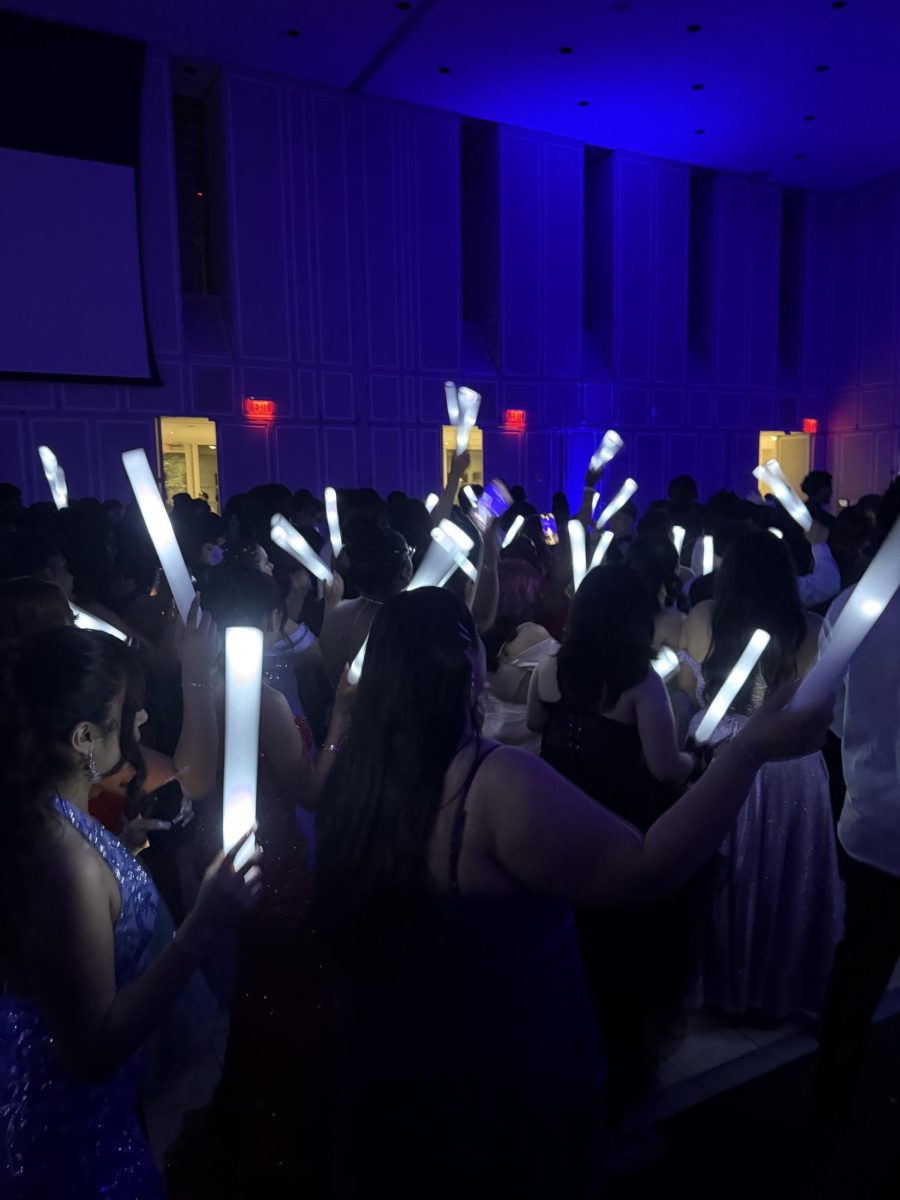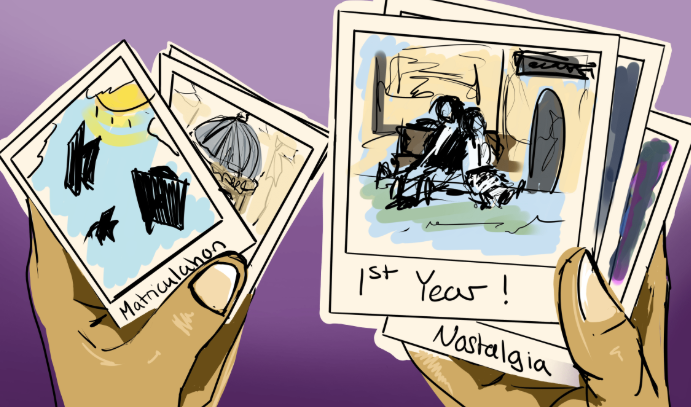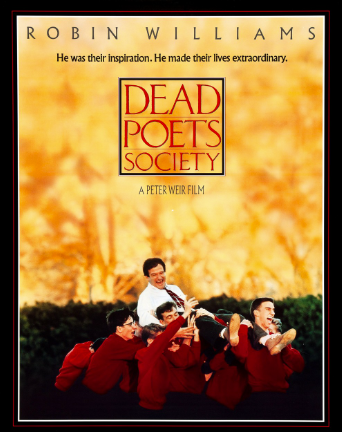Introduction
What does censorship look like? It isn’t always banning everyone from speaking their opinions. Sometimes, it’s the systematic mission to deem certain opinions or ideologies worth killing people over. Sometimes, it’s systematic removal of the ugly parts of one’s country’s history. And sometimes, censorship looks like distracting everyone so those in power can do whatever they want right under our noses. Fahrenheit 451 by Ray Bradbury follows Guy Montag, a fireman living in an unnamed city in
America. In this universe, firemen start fires. Firemen used to put fires out but Montag, the government, and the fire station as a whole refuses to acknowledge that fact.
The Hearth and the Salamander
The Hearth and the Salamander begins with Guy Montag, our protagonist, burning books.. He’s a fireman, a man that starts fires. Simple enough. When Montag is going home for the night, he runs into a teenage girl on the street. Clarisse McClellan introduces herself, by saying she’s “seventeen and crazy” because her uncle says “the two always go together.” In Montag’s eyes, she’s totally crazy. She thinks for fun and worst of all, she talks so much. Montag doesn’t dwell on it for long and with that, he heads home.
He walks into his home, the one he shares with his wife, Mildred Montag. He walks through the dark house, knowing the home like the back of his own hand. He spots his wife, laying on the bed. She’s pale and still. He approaches her, kicking something near the bed. Montag calls the emergency services, having some men come in with two machines: One to pump her stomach out and another to replace her blood.
One of the men mention something that I think is important to the theme of this book. “You take the old and put in the new and you’re okay.” A few hours and after the men leave, Mildred wakes up. She’s hungry, which makes sense because the men gave her a contrasedative. “Contra” means to work against, so the drug is meant to be the opposite of a sedative. The contrasedative also seems to symbolize something more so, I’ll get to that in the interpretation section. Montag, who is still distressed from the previous moments, tries reminding Mildred of the events that happened just a few hours earlier. As she answers the barrage of questions from Montag, it’s like she doesn’t want to dwell on it. She focuses on the parlor walls, walls of large TVs. The parlor reminds me of virtual reality. She wonders what’s on today, so she picks up her script that was mailed to her that morning. The parlor programs are like plays. And like she’s participating in a “play,” Mildred reads over her lines as if she’s in the story with the characters.
The more they talk, the more I get the feeling that Mildred doesn’t understand or know how to empathize with Montag when she asks about a fourth parlor wall. mentions that it’s a third of his yearly pay. She dismisses him. Montag hesitates before leaving and asks Mildred something that I also think is important. He asks if the play has a happy ending. Going with my point of entertaining yourself to death, the people of this society want the immediate results, skipping to the end of the story without unde
rstanding how they got there. Instant gratification is the tendency to seek immediate results, pleasure and sensations. As the story goes on the concept of instant gratification becomes more important.
As he leaves Montag walks through the rain and runs into Clarisse. She rubs a dandelion under her chin, saying that it’s an indicator of whether or not you’re in love. If it rubs off, you’re not in love and if it doesn’t, you’re in love. She rubs the dandelion under her chin and it turns her chin yellow. When she tries to rub it in Montag, it rubs off.
“What a shame,” Clarisse shrugs it off. “You’re not in love with anyone.”
Um…what does that mean? What is she even talking about? He’s married, of course he’s in love. After a tense conversation Clarisse and Montag’s conversation gets tense and before she leaves, she apologizes and asks for forgiveness.
Interpretation of the Characters
That’s the first half of The Hearth and the Salamander. In my interpretation, Montag is a rough looking man. Pale, because we mostly see him out at night. In this world, there isn’t a need to leave your house unless you’re seeking entertainment or working. I’d like to think he has ashy brown, almost black hair and a light beard. Although he’s a fireman, he’s not a fireman in the traditional sense. I imagine him to be slightly more muscular than the average man. I believe it’s said that he’s around 30, so I’d say he’s around 34.
As for what Montag stands for? He’s the main character and symbolizes the want for something more under oppression. A story of trying to get more, to experience more and to be more. More of what? That’s up to you if you read the book.
Clarisse is a pale girl with almost white, blonde hair. She’s a 17 year old girl with two parents and an uncle that are equally as odd as she is. In my interpretation, she’s tall and thin. Clarisse is the catalyst to resistance. She’s the rebellion, the last evidence that the new world even existed in the first place. Although books are banned, Clarisse and her family hold the same philosophy of the point of books
Mildred is barely 30, maybe about 29. To me, Mildred is an average looking woman. Nothing notable about her and nothing very identifiable. Just another white woman, a brunette with an average build and an average wardrobe. Since this is taking place during a cold war like setting, I’d like to think she’d be in typical 50’s housewife attire. A colorful but conservative dress, a neck length hairstyle and modest brown flats. Mildred represents the status quo. She’s the willing average citizen, she’s the type of person that’s afraid of change. Mildred is our first glimpse into what this society does to its people.
 Critique and thoughts
Critique and thoughts
I enjoy twists on concepts that we, the readers, are familiar with. Bradbury takes the concept of a fireman and uses it as the first glimpse into the world he created. This prompts the reader to ask themselves questions. On my first read in 10th grade, I asked why the firemen are burning books instead of helping people? It’s such a minor change from the regular timeline or world we live in today but the more you think about it, you begin to ask yourself what else has been flipped?
I don’t have a lot of criticisms for this part of the book. I think it fits well into the book. Things just happen. No one understands why and no one cares to think about it. Montag burns books, he goes home to meet a weird kid. His wife overdoses. Mildred alone is enough to traumatize people but it’s not really dwelled on because I don’t think Montag understands how to dwell.
Connections to the Real World
As of March 2025, the world has been changing more rapidly than ever before. We have a new president, new worries, and new technology. Since the pandemic, I’ve noticed something. We, as a society, were all on social media during the lockdown. We learned new hobbies, made new trends, engaged with politics on a whole different level—but why?
We needed to cope with the widespread death and sickness. Families were torn apart, whether it be from death or stay at home order. We couldn’t go to work, we couldn’t go to school. Heck! We could barely even go to the grocery store like normal. Everything changed so fast over the span of weeks, no wonder we wanted to distract ourselves. But here’s the funny thing: We didn’t stop distracting ourselves after it ended. We commercialized marginalized identities as the coolest, trendiest thing. We rebranded having books as the “It-girl” thing to do. Not reading, just simply owning books. We created new insecurities, new ways to demonize groups of people and to over consume.
But what does this have to do with anything? Rue, this is a book review, right?
Rereading the first part of The Hearth and the Salamander made me connect it with the current political and social climate of our world. In this part of the book, we see a lot of parallels between our world and the world of Fahrenheit. The people in this story are extremely distracted. Just like us. First, it was radio and then, it was movie theatres. And then it was T.Vs and then phones and then what? Will we ever have parlor rooms like in Fahrenheit 451? Will we resort to shoving entertainment into every facet of our life? Only time will tell. Or will our society listen to the warning, recognize the parallels and try to prevent it?
In the next review of the Hearth and the Salamander, I will finish the first chapter and will try to answer some questions I have. How does Fahrenheit 451 portray censorship and what form does censorship take in influencing Montag? At the end of that review, I will rate the chapter and give a more comprehensive review. I truly recommend this book, I think it’s a good talking point when paired with talking about politics or censorship in the modern day.















